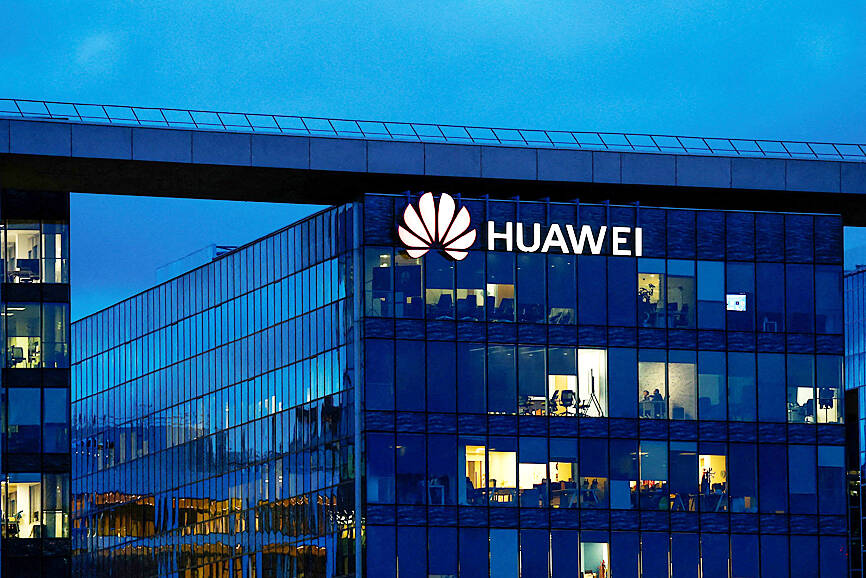Huawei Technologies Co (華為) and its partner Semiconductor Manufacturing International Corp (SMIC, 中芯) relied on US technology to produce an advanced chip in China last year, people with knowledge of the matter said.
Shanghai-based SMIC used gear from California-based Applied Materials Inc and Lam Research Corp to manufacture an advanced 7-nanometer chip for Huawei last year, the people said, asking not to be named as the details are not public.
The previously unreported information suggests that China still cannot entirely replace certain foreign components and equipment required for cutting-edge products like semiconductors.

Photo: Gonzalo Fuentes, Reuters
The country has made technological self-sufficiency a national priority and Huawei’s efforts to advance domestic chip design and manufacturing have received the backing of Beijing.
Lauded in China as a major leap in indigenous semiconductor fabrication, last year’s SMIC-made processor powered Huawei’s Mate 60 Pro and a wave of patriotic smartphone-buying in the Asian country. The chip is still generations behind the top components from global firms, but ahead of where the US hoped to stop China’s advance.
However, the machinery used to make it still had foreign sources, including technology from Dutch maker ASML Holding NV, as well as the gear from Lam and Applied Materials.
Bloomberg News reported in October that SMIC had used equipment from ASML for the chip breakthrough.
Leading Chinese chip equipment suppliers — including Advanced Micro-Fabrication Equipment Inc (中微半導體設備) and Naura Technology Group Co (北方華創) — have been trying to catch up with their US peers, but their offerings are still not as comprehensive or sophisticated.
China’s top lithography system developer Shanghai Micro Electronics Equipment Group Co (上海微電子) still lags a few generations behind what industry leader ASML is capable of.
SMIC obtained the US machinery before Washington banned such sales to China in October 2022, some of the people said. Both firms were among the US suppliers that began pulling their staff from China after those rules went into effect and prohibited US engineers from servicing some machines in the Asian country.
ASML also told US employees to stop working with Chinese customers in response to the US curbs, but Dutch and Japanese engineers are still able to service many machines in China — much to the chagrin of their US rivals.
Companies are now prohibited from selling cutting-edge, US-origin technology to either SMIC or Huawei. Both tech firms have been blacklisted by the US for alleged links to the Chinese military.
US Department of Commerce officials have said they have not seen evidence that SMIC can make the 7-nanometer chips “at scale,” a point echoed by ASML chief executive Peter Wennink.
If SMIC wants to advance its technology without ASML’s state-of-the-art extreme ultraviolet lithography systems, the Chinese chipmaker would not be able to produce chips at a commercially meaningful volume due to technical challenges, he told Bloomberg News in late January.
“The yield is going to kill you. You’re not going to get the number of chips that you need to have high volume chip production,” Wennink said.
ASML has not been able to sell its extreme ultraviolet lithography systems to China, as the Dutch government has not issued a license allowing those exports.

In Italy’s storied gold-making hubs, jewelers are reworking their designs to trim gold content as they race to blunt the effect of record prices and appeal to shoppers watching their budgets. Gold prices hit a record high on Thursday, surging near US$5,600 an ounce, more than double a year ago as geopolitical concerns and jitters over trade pushed investors toward the safe-haven asset. The rally is putting undue pressure on small artisans as they face mounting demands from customers, including international brands, to produce cheaper items, from signature pieces to wedding rings, according to interviews with four independent jewelers in Italy’s main

Japanese Prime Minister Sanae Takaichi has talked up the benefits of a weaker yen in a campaign speech, adopting a tone at odds with her finance ministry, which has refused to rule out any options to counter excessive foreign exchange volatility. Takaichi later softened her stance, saying she did not have a preference for the yen’s direction. “People say the weak yen is bad right now, but for export industries, it’s a major opportunity,” Takaichi said on Saturday at a rally for Liberal Democratic Party candidate Daishiro Yamagiwa in Kanagawa Prefecture ahead of a snap election on Sunday. “Whether it’s selling food or

CONCERNS: Tech companies investing in AI businesses that purchase their products have raised questions among investors that they are artificially propping up demand Nvidia Corp chief executive officer Jensen Huang (黃仁勳) on Saturday said that the company would be participating in OpenAI’s latest funding round, describing it as potentially “the largest investment we’ve ever made.” “We will invest a great deal of money,” Huang told reporters while visiting Taipei. “I believe in OpenAI. The work that they do is incredible. They’re one of the most consequential companies of our time.” Huang did not say exactly how much Nvidia might contribute, but described the investment as “huge.” “Let Sam announce how much he’s going to raise — it’s for him to decide,” Huang said, referring to OpenAI

The global server market is expected to grow 12.8 percent annually this year, with artificial intelligence (AI) servers projected to account for 16.5 percent, driven by continued investment in AI infrastructure by major cloud service providers (CSPs), market researcher TrendForce Corp (集邦科技) said yesterday. Global AI server shipments this year are expected to increase 28 percent year-on-year to more than 2.7 million units, driven by sustained demand from CSPs and government sovereign cloud projects, TrendForce analyst Frank Kung (龔明德) told the Taipei Times. Demand for GPU-based AI servers, including Nvidia Corp’s GB and Vera Rubin rack systems, is expected to remain high,